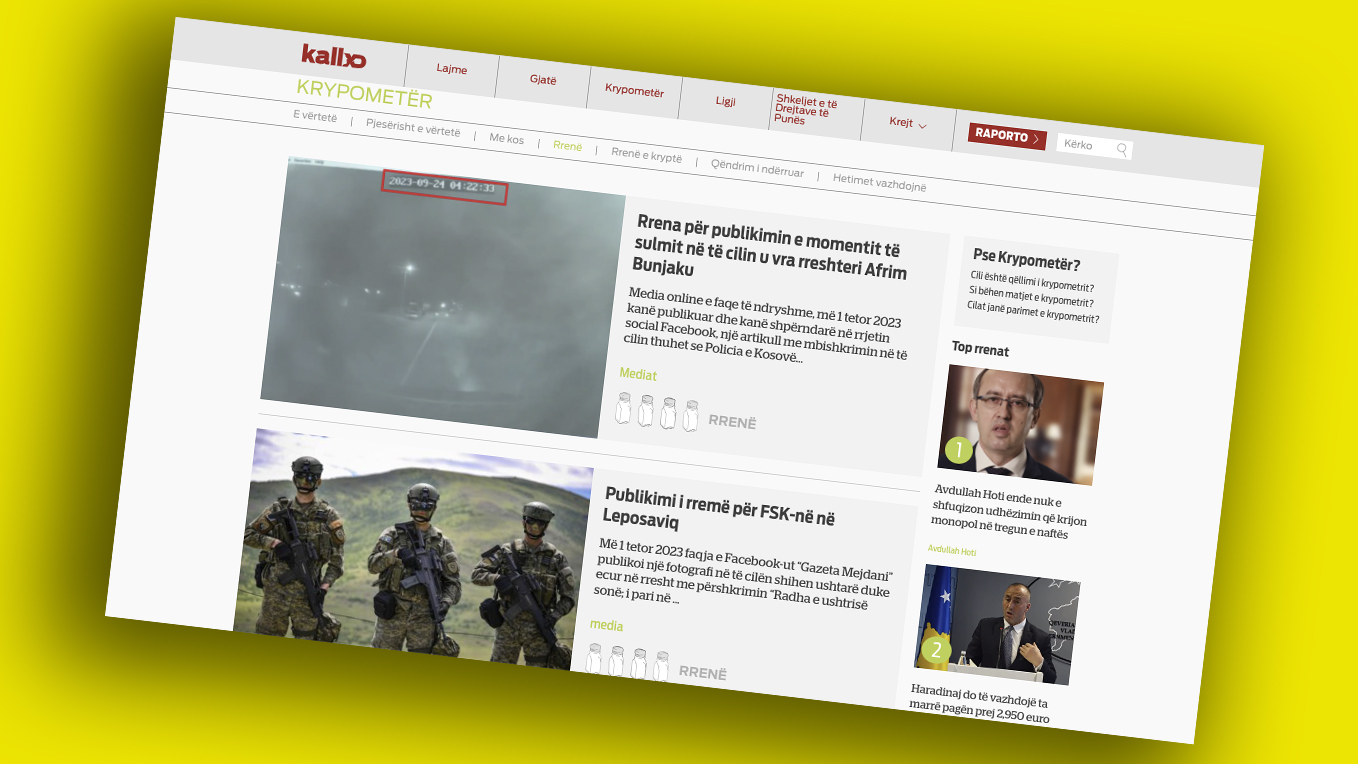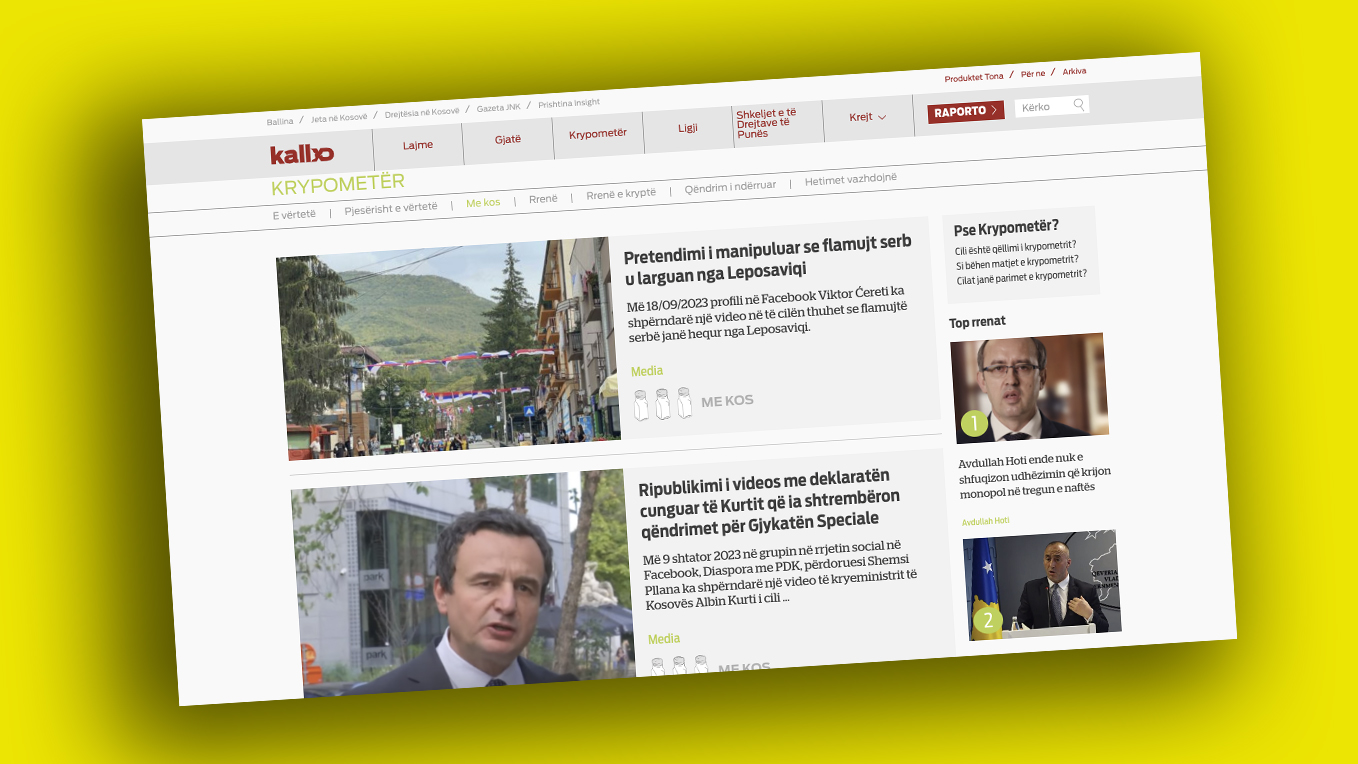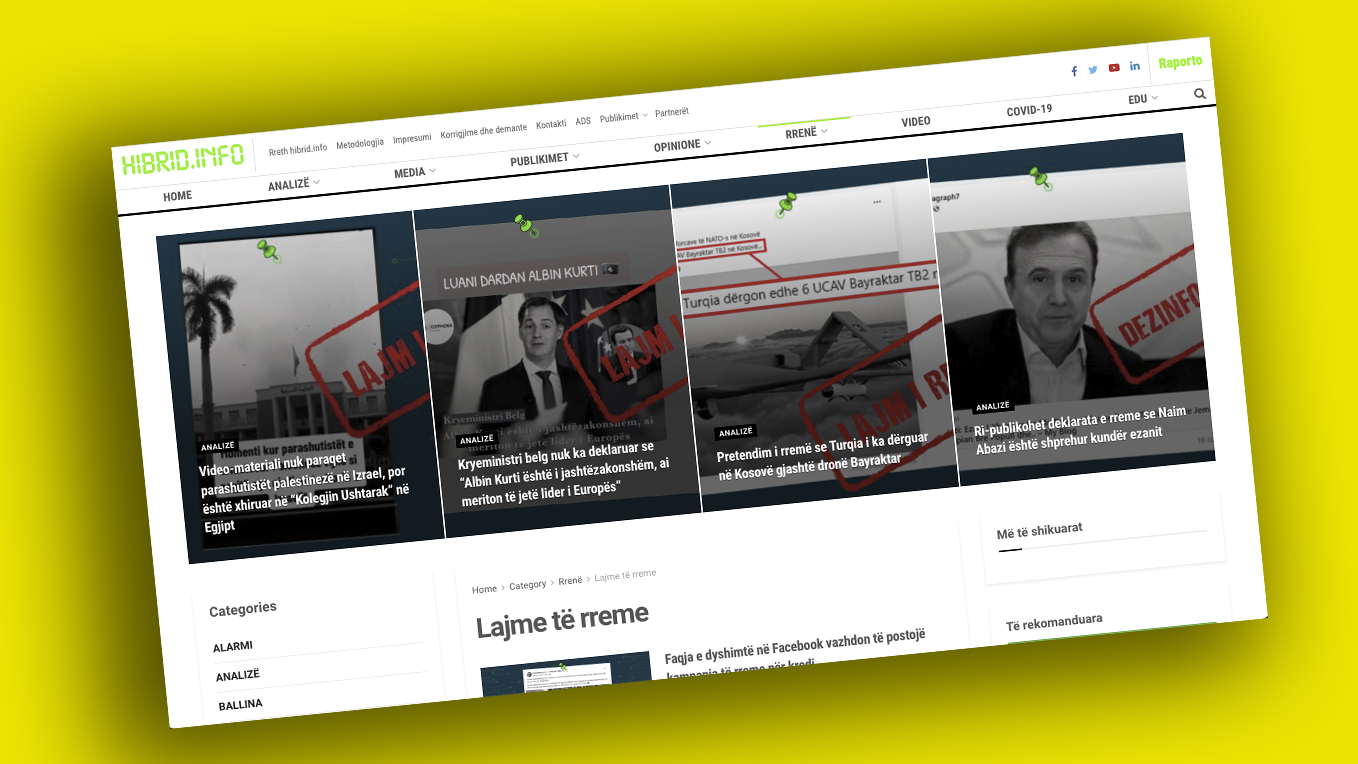“Even Vlora Çitaku has a Serbian passport!” “Mega scandal, Srpska Lista leader Goran Rakić has an intimate meeting on a yacht,” “Business loans up to 50,000 euros.” These are just a few examples of the disinformation shared on Facebook this year.
Disinformation published in the media spreads false information about public figures, political developments and social issues. It also offers unverified cures for various diseases, false job calls from European countries and deceptive opportunities for quick loans. A lot of disinformation is posted on Facebook from suspicious or fake accounts, but it also comes from established online media outlets.
The latest data from the social media analytics company That Ad indicates that as of September 7 there are approximately 950,000 open accounts in Kosovo. As the most popular social media platform in Kosovo, the media tailors content especially for this audience, such as short videos, infographics and live broadcasts.
Shkëlzen Osmani, the director of the fact-checking outlet Hibrid.info, said that Facebook contains many media outlets within it. “Facebook is now like a universe. In that universe there are many other celestial bodies, but Facebook has included them within its universe,” said Osmani.
Anyone with access to Facebook can publish content there. Social media networks owned by Meta — formerly known as Facebook and which owns WhatsApp, Instagram and Threads — do not make a distinction between media pages and other content publishers.
“There is nothing that tells you what pages are media outlets, influencers, health pages or institutions. You are informed depending on how the algorithm places them in your feed,” said Osmani. The social media algorithm determines the content’s audience based on the user’s prior preferences, which are determined based on likes, shares, clicks and user interactions.
This audience of nearly a million users is also targeted by suspicious and fake accounts that spread disinformation to generate money through clicks or to promote specific agendas. Globally, Facebook has over 3 billion users, ranking it among the top social media platforms in terms of user numbers. Facebook is also a leading platform in the spread of disinformation.
Meta has come under significant pressure for allowing the spread of disinformation, particularly after the 2016 American elections. It was shown that the spread of disinformation on social media influenced the election and that millions of users’ private data was sold for use in the election campaign.
During the campaigns, CNN revealed that a group of young people from North Macedonia operated a fake news farm by creating fake profiles of American citizens. They benefited financially from spreading fake news since they earned a certain amount for each click. This fake news largely favored Donald Trump. It was falsely claimed that Pope Francis supported Trump and that Bill Clinton, husband of presidential candidate Hillary Clinton, sexually assaulted a 13-year-old girl. Due to this fake news and the harvesting of private data, Facebook founder Mark Zuckerberg was called to testify before the U.S. Congress in 2018.
Meta began collaborating with fact-checkers to combat disinformation, starting with Facebook in 2017, WhatsApp in 2018 and Instagram in 2019. The newly launched social media platform Threads does not currently collaborate with fact-checkers.
Meta’s collaboration with fact-checkers in Kosovo started in 2018.
Facebook under the fact-checkers’ lens
In Kosovo, one of the main fact-checkers is Krypometri, which has been part of the online media outlet Kallxo.com since 2016. In 2018, Krypometri received Facebook’s approval to review content and rate its accuracy. Krypometri is now what is known as a “third party fact-checker” and is so far the only Meta collaborator in Kosovo. Krypometri is also part of the International Fact Checkers Network (IFCN), an organization that monitors fact-checking trends, provides training resources and a venue for collaboration for nearly 200 fact-checking organizations worldwide.
Categories of disinformation
There are six categories that can be reported through third-party fact-checkers:
-lacking context (when the content indirectly conveys a false claim),
-manipulated (when video, audio, or photographic material is altered in a way that can mislead the audience),
-partially false (when the publication has some inaccuracies in facts),
-fake (not based on facts),
-satire (when the material uses irony or exaggeration and may not be easily understood as such by the audience), and
-true (when there are no inaccuracies).
Third-party fact-checkers identify and review posts on Facebook. If fact-checkers mark content as inaccurate or incomplete, a warning is displayed on the post, indicating that fact-checkers say it is fake news or lacks context. This also serves as a barrier to accessing the content, since users cannot open it without first seeing the warning and clicking on “See Why.“
When you click the “See Why” button, a new panel appears. Here, you have the option to click on the Krypometri article that explains why the post has been marked as disinformation. Below the article, there is the option to view the disinformation by clicking “View Post.”
On an almost daily basis, Krypometri deals with Facebook pages that are already marked as spreading fake information or news which lacks context.

In 2018, Krypometri received Facebook’s approval to review content and rate its accuracy.
In August 2023, the public broadcaster’s portal, rtklive.com, published a sponsored article on Facebook titled “The Economist: Kosovo with economic growth surpasses Balkan neighbors.” Its description read “The British magazine The Economist has written an article about Kosovo titled “Start-up nation – how Kosovan companies are defying expectations to lead the country into the future.””
Underneath this article, there was a warning on Krypometri that said, “Lacking context – independent fact-checkers say this information lacks context and may mislead people.” The inaccuracy was that it was not published in The Economist but in The Economist Impact, and it was sponsored by the Kosovo Chamber of Commerce, the American Chamber of Commerce and a USAID project. The Economist Impact is part of the Economist Group. What sets it apart from The Economist newspaper is that The Economist Impact allows the publication of sponsored content. As such, the article was not informative but promotional.
Most of the recent articles on Krypometri are about politics. Many are related to disinformation posts targeting the current government. The Komentet Politike page on Facebook published a poster featuring Xhelal Sveçla, Minister of Internal Affairs, that read “Xhelal declared all KLA veterans collaborators with Serbia.” After the article was fact-checked and marked as disinformation, the Komentet Politike Facebook page decided to delete the post.
The deputy leader of the largest opposition party, the Democratic Party of Kosovo (PDK), Vlora Çitaku, was also a target of disinformation on Facebook when an account baselessly claimed that she had Serbian citizenship. In the reel where this claim was made, there was a warning that stated “False information. Independent fact-checkers say this information is unsupported by facts.”
According to Facebook’s policies, accounts that publish disinformation that are marked by Meta’s partner fact-checkers will have their visibility reduced within the platform.

Disinformation contains incorrect information about public figures, political developments and social issues.
Kreshnik Gashi, managing editor of Kallxo, said that after they identify posts as false or lacking context, some pages remove the posts, while others correct their content.
“There are two groups. The first group includes anonymous pages that cannot be identified and it is unclear who is behind them. These pages have a large outreach. They don’t care about losing their audience as they are not interested in informing,” said Gashi. According to Gashi, the other group are pages belonging to the online news media and aim to be in the media market for a long time, so they mark their articles as edited or corrected.
“It’s not yet standardized or fully integrated as a policy across all media in Kosovo, but this has started to change,” said Gashi.
Valon Canhasi, founder of the digital marketing company Hallakate, said that fake accounts have become increasingly present during election campaigns. The rise of disinformation during election campaigns is a global phenomenon.
According to Canhasi, any attempts to assess the number of fake accounts is bound to fail.
“It’s hard to come up with a specific number, but platforms have become so sophisticated that these are in a very small percentage. In reality, real accounts are the problem because they share this kind of information,” said Canhasi.
According to a report by the National Democratic Institute (NDI), which monitored online news media and social media from March 2020 to February 2021, many Facebook groups and fan pages that are created to support a party or a cause spread disinformation, especially during election periods.
Osmani, from Hibrid.info, which is also part of IFCN, said that despite not being an official Facebook partner, they have ways to communicate with Facebook when it comes to fact-checking.
“Facebook algorithms usually notice on their own when a fact-checker or IFCN member deals with content on the platform,” he said.

The fact checker Hibrid.info debunks articles containing disinformation on a daily basis.
Hibrid.info is in negotiations with Facebook for the status of a third-party fact-checker and in January of this year it started monitoring social media. According to the first monitoring report published for the period between January to June 2023, Facebook was the main social media platform where the distribution of disinformation related to events in Kosovo occurred.
Disinformation on TikTok, Twitter and Telegram
In June of this year, a fabricated video created with the help of artificial intelligence, known as a deep fake, was shared by hundreds of people on X, formerly known as Twitter, and by Facebook pages.
In the deep fake video a photo of Kosovo’s Prime Minister Albin Kurti and the United States Ambassador to Kosovo, Jeffrey Hovenier, was manipulated. In the fabricated video, Hovenier is seen telling Kurti that there will be consequences for the unjust arrests of Serbs in the north of Kosovo. Kurti responds to Hovenier, saying he will arrest Serbs regardless of whether or not they have committed crimes, to bring the north of the country under Kosovo’s control. Hovenier’s voice and accent sound similar to his real voice, but Prime Minister Kurti is given a British accent.
This video was shared during a period of tension in the Serb-majority municipalities in northern Kosovo after the April 24 municipal elections.
Adea Beqaj, a senior official for NDI’s Information Integrity program, said that the purpose of this misinformation is to sow distrust.
“Kosovo’s Prime Minister and the American Ambassador were used and through a fabricated conversation an attempt was made to harm both parties. The context of this manipulation of information is important because it plays a role in destabilizing the country and deepening the ethnic divisions between Serbs and Albanians,” said Beqaj.
Messaging apps are more difficult to monitor because moderators in closed groups decide what is shared.
The fabricated video also circulated in Telegram groups with a significant number of followers. Telegram is a messaging app that allows the creation of groups and channels, which can be followed by anyone with an account.
According to NDI, the Serbian-language channel “BUNT je stanje duha ☦,” or “REVOLT is a state of mind” has a significant number of Serb users in the north of Kosovo.
The Telegram group has over 70,000 followers and makes daily posts related to Kosovo, which include disinformation and hate speech. Messaging apps are more difficult to monitor because moderators in closed groups decide what is shared.
In the Telegram app, there is an option to report content to the platform and contact the account manager, although the phone number and administrator’s name can be hidden.
In Kosovo, Hibrid.info has debunked false news multiple times published on the channel BUNT. Combating disinformation on messaging app channels like Telegram is more challenging since fact-checkers can’t use social media monitoring tools that work on other platforms.
Twitter is less commonly used in Kosovo. According to data from the company Hallakate, Twitter had 102,000 users in Kosovo in July 2022. Despite having fewer users, political content shared on the platform is also spread on more popular social media platforms.
“If someone has posted something false on Twitter, whether it’s a politician or an influencer, you can easily find it reposted on Facebook, Instagram or TikTok, by other media outlets and other people,” said Gashi from Kallxo.
The disinformation on Twitter is often spread through bots, which are used to spread disinformation and incite hatred. Bots, also known as “zombies” once a device has been infected, are computer programs that imitate human users. However, some bot-like activity is also carried out by individuals.
Bots often share and like each other’s messages and spread unverified or false claims to create an online atmosphere either for or against a specific idea or person.
Researcher Agon Maliqi exposed one such Twitter bot that was spreading nationalist narratives in both Kosovo and Serbia. “It’s time for Albania and Kosovo to merge and unite,” read a post on the profile Malcolm16991871, which had tagged American senators, including Democrats Chris Murphy and Jeanne Shaheen. However, as Maliqi showed, the same profile had also shared a post from the Serbian Progressive Party (SNS), the political party of Serbian President Aleksandar Vučić.
SNS reportedly pays people to comment and distribute content online, either supportive of the SNS and Vučić or critical of SNS's political opponents.
“There’s an army of bots like this one, pretending to be Albanian nationalists. They use hate speech against Serbs and distribute calls for nationalist gatherings in Tirana. Poor Malcolm, he confused the profiles and reshared the SNS post,” Maliqi wrote in a July tweet. According to him, the content shared by bots on Twitter varies but often comes from profiles with real individuals behind them, not just automated accounts.
“For example, they spread sectarian divisions, nationalism and ethnic hatred. Bots are not the only creators of this content, it can also come from real people with authentic profiles. Anyway, bots amplify and redistribute this content as needed,” said Maliqi. Based on his own observations, Maliqi claimed to have seen 500 such profiles between 2020 and 2023.
SNS reportedly pays people to comment and distribute content online, either supportive of the SNS and Vučić or critical of SNS’s political opponents.
During 2020, Twitter closed 8,500 profiles serving the SNS. Stefan Janjić, editor-in-chief of Fake News Tragac and assistant professor at the University of Novi Sad, explains in his recent article for K2.0 how SNS’s bots resemble an online army of over 8,000 real individuals taking orders from SNS.
Both Krypometri and Hibrid.info deal with disinformation published on TikTok, but they say it's difficult to monitor due to the high volume.
Fact-checkers in Kosovo are concerned about the content published on TikTok and speak about the lack of filtering content. TikTok, a social media platform owned by the Chinese company Bytedance, is believed to have hundreds of thousands of users in Kosovo. There is no accurate user count as the platform does not list Kosovo as a country.
Both Krypometri and Hibrid.info deal with disinformation published on this platform, but they say it’s difficult to monitor due to the high volume.
Gashi said that TikTok is being used to spread disinformation and hate speech.
A Tiktok video that has over 800 shares shows the owner of a horse ranch in Obiliq. In the video, the filming of the movie “Dasma në Male” (Wedding in the Mountains) was taking place in his ranch and the actors and ranch owner were wearing KLA uniforms. In June 2023, the Patriotizamsrb Tiktok profile, which publishes content in Serbian and has over 4,000 followers, republished the video to deliberately spread disinformation. The republished video falsely claimed that the ranch owner is a terrorist and made his name public. The video has over 7,000 likes, nearly 1,000 comments, 830 shares and 1,300 profiles have saved it to watch later.
Osmani said that Tiktok poses a high risk, especially taking into account the age of the users. “TikTok has gained significant popularity, especially among the younger audience,” he said.
Although there is no accurate data on TikTok usage in Kosovo, it is believed to have many more users than Twitter due to the appeal of short format videos among young people. This suggests that Facebook’s dominance is being challenged by the preferences of younger audiences. According to data from That Ad, as of September 7 the 18 to 24 age group has 193,200 users on Instagram as opposed to 187,500 on Facebook.
Both Facebook and YouTube, as well as TikTok, Twitter and Telegram have been accused of profiting at the expense of users, either by failing to combat disinformation or by giving the green light to content that incites hatred and violence.
Feature Image: Atdhe Mulla via Midjourney
This article was developed in partnership with the regional initiative Western Balkans Anti-Disinformation Hub, implemented by the Metamorphosis Foundation with financial support from the Ministry of Foreign Affairs of the Kingdom of the Netherlands. The contents of the article are the responsibility of Kosovo 2.0 and do not necessarily reflect the positions of the project partners and donor.




